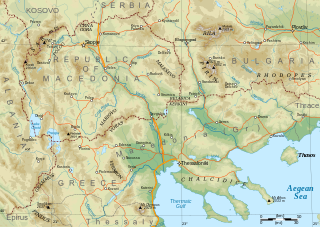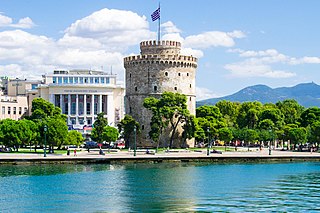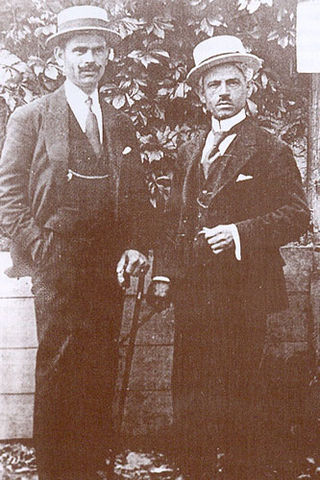Related Research Articles

Bitola is a city in the southwestern part of North Macedonia. It is located in the southern part of the Pelagonia valley, surrounded by the Baba, Nidže, and Kajmakčalan mountain ranges, 14 kilometres north of the Medžitlija-Níki border crossing with Greece. The city stands at an important junction connecting the south of the Adriatic Sea region with the Aegean Sea and Central Europe, and it is an administrative, cultural, industrial, commercial, and educational centre. It has been known since the Ottoman period as the "City of Consuls", since many European countries had consulates in Bitola.

The Balkan Wars were a series of two conflicts that took place in the Balkan states in 1912 and 1913. In the First Balkan War, the four Balkan states of Greece, Serbia, Montenegro and Bulgaria declared war upon the Ottoman Empire and defeated it, in the process stripping the Ottomans of their European provinces, leaving only Eastern Thrace under Ottoman control. In the Second Balkan War, Bulgaria fought against the other four original combatants of the first war. It also faced an attack from Romania from the north. The Ottoman Empire lost the bulk of its territory in Europe. Although not involved as a combatant, Austria-Hungary became relatively weaker as a much enlarged Serbia pushed for union of the South Slavic peoples. The war set the stage for the July crisis of 1914 and thus served as a prelude to the First World War.

Macedonia is a geographical and historical region of the Balkan Peninsula in Southeast Europe. Its boundaries have changed considerably over time; however, it came to be defined as the modern geographical region by the mid-19th century. Today the region is considered to include parts of six Balkan countries: all of North Macedonia, large parts of Greece and Bulgaria, and smaller parts of Albania, Serbia, and Kosovo. It covers approximately 67,000 square kilometres (25,869 sq mi) and has a population of around five million. Greek Macedonia comprises about half of Macedonia's area and population.
The history of North Macedonia encompasses the history of the territory of the modern state of North Macedonia.

Skopje is the capital and largest city of North Macedonia. It is the country's political, cultural, economic, and academic centre. Skopje lies in the Skopje Basin.

Thessaloniki, also known as Thessalonica, Saloniki, Salonika, or Salonica, is the second-largest city in Greece, with slightly over one million inhabitants in its metropolitan area, and the capital of the geographic region of Macedonia, the administrative region of Central Macedonia and the Decentralized Administration of Macedonia and Thrace. It is also known in Greek as "η Συμπρωτεύουσα", literally "the co-capital", a reference to its historical status as the Συμβασιλεύουσα or "co-reigning" city of the Byzantine Empire alongside Constantinople.

The First Balkan War lasted from October 1912 to May 1913 and involved actions of the Balkan League against the Ottoman Empire. The Balkan states' combined armies overcame the initially numerically inferior and strategically disadvantaged Ottoman armies, achieving rapid success.

The Second Balkan War was a conflict that broke out when Bulgaria, dissatisfied with its share of the spoils of the First Balkan War, attacked its former allies, Serbia and Greece, on 16 (O.S.) / 29 (N.S.) June 1913. Serbian and Greek armies repulsed the Bulgarian offensive and counterattacked, entering Bulgaria. With Bulgaria also having previously engaged in territorial disputes with Romania and the bulk of Bulgarian forces engaged in the south, the prospect of an easy victory incited Romanian intervention against Bulgaria. The Ottoman Empire also took advantage of the situation to regain some lost territories from the previous war. When Romanian troops approached the capital Sofia, Bulgaria asked for an armistice, resulting in the Treaty of Bucharest, in which Bulgaria had to cede portions of its First Balkan War gains to Serbia, Greece and Romania. In the Treaty of Constantinople, it lost Adrianople to the Ottomans.

Tetovo is a city in the northwestern part of North Macedonia, built on the foothills of Šar Mountain and divided by the Pena River. The municipality of Tetovo covers an area of 1,080 km2 (417 sq mi) at 468 meters (1,535 ft) above sea level, with a population of 63,176. The city of Tetovo is the seat of Tetovo Municipality.

The Macedonian Struggle was a series of social, political, cultural and military conflicts that were mainly fought between Greek and Bulgarian subjects who lived in Ottoman Macedonia between 1893 and 1912. The conflict was part of a wider guerilla war in which revolutionary organizations of Greeks, Bulgarians and Serbs all fought over Macedonia. Gradually the Greek and Bulgarian bands gained the upper hand. Though the conflict largely ceased by the Young Turk Revolution, it continued as a low intensity insurgency until the Balkan Wars.

The culture of North Macedonia refers the culture of the Republic of North Macedonia, a country in Southeast Europe. Macedonian culture has contributed to the culture of the Balkans, and the wider culture of the European continent.

Yane Sandanski was a Macedonian Bulgarian revolutionary. He is recognized as a national hero in both Bulgaria and North Macedonia.

The Manaki brothers, Yanaki and Milton, were two Aromanian photography and cinema pioneers within the Balkan Peninsula and the Ottoman Empire. They were the first to bring a film camera and create a motion picture in the city of Manastir, an economic and cultural center of Ottoman Rumelia. Their first film, The Weavers, was a 60-second documentary of their grandmother spinning and weaving; this is regarded as the first motion picture shot in the Balkans. The Manaki brothers used a 35 mm Urban Bioscope camera that Yanaki imported from London in 1905. Yanaki and Milton filmed documentaries about various aspects of life in the city of Manastir.

Bulgarian irredentism is a term to identify the territory associated with a historical national state and a modern Bulgarian irredentist nationalist movement in the 19th and 20th centuries, which would include most of Macedonia, Thrace and Moesia.

The National Schism, also sometimes called The Great Division, was a series of disagreements between King Constantine I and Prime Minister Eleftherios Venizelos regarding the foreign policy of Greece in the period of 1910–1922 of which the tipping point was whether Greece should enter World War I. Venizelos was in support of the Allies and wanted Greece to join the war on their side, while the pro-German King wanted Greece to remain neutral, which would further favor the plans of the Central Powers.

The Serbs are one of the constitutional ethnic groups of North Macedonia, numbering about 24,000 inhabitants.

Macedonian nationalism is a general grouping of nationalist ideas and concepts among ethnic Macedonians that were first formed in the late 19th century among separatists seeking the autonomy of the region of Macedonia from the Ottoman Empire. The idea evolved during the early 20th century alongside the first expressions of ethnic nationalism among the Slavs of Macedonia. The separate Macedonian nation gained recognition during World War II when the Socialist Republic of Macedonia was created as part of Yugoslavia. Macedonian historiography has since established links between the ethnic Macedonians and various historical events and individual figures that occurred in and originated from Macedonia, which range from the Middle Ages up to the 20th century. Following the independence of the Republic of Macedonia in the late 20th century, issues of Macedonian national identity have become contested by the country's neighbours, as some adherents to aggressive Macedonian nationalism, called Macedonism, hold more extreme beliefs such as an unbroken continuity between ancient Macedonians, and modern ethnic Macedonians, and views connected to the irredentist concept of a United Macedonia, which involves territorial claims on a large portion of Greece and Bulgaria, along with smaller regions of Albania, Kosovo and Serbia.

Armen Kouptsios was a Macedonian Greek revolutionist.

North Macedonia, officially the Republic of North Macedonia, is a landlocked country in Southeast Europe. It shares land borders with Greece to the south, Albania to the west, Bulgaria to the east, Kosovo to the northwest and Serbia to the north. It constitutes approximately the northern third of the larger geographical region of Macedonia. Skopje, the capital and largest city, is home to a quarter of the country's population of 1.83 million. The majority of the residents are ethnic Macedonians, a South Slavic people. Albanians form a significant minority at around 25%, followed by Turks, Roma, Serbs, Bosniaks, Aromanians and a few other minorities.

The Serbian Revolutionary Organization or Serbian Chetnik Organization was a paramilitary revolutionary organization with the aim of liberation of Old Serbia from the Ottoman Empire. Its Central Committee was established in 1902, while the Serbian Committee was established in September 1903 in Belgrade, by the combined Central Boards of Belgrade, Vranje, Skopje and Bitola. Its armed wing was activated in 1904. Among the architects were members of the Saint Sava society, Army Staff and Ministry of Foreign Affairs. It operated during the Struggle for Macedonia, a series of social, political, cultural and military conflicts in the region of Macedonia; its operations are known as Serb Action in Macedonia.
References
- ↑ German Film & Literature. D. Holloway. 1995. p. 55.